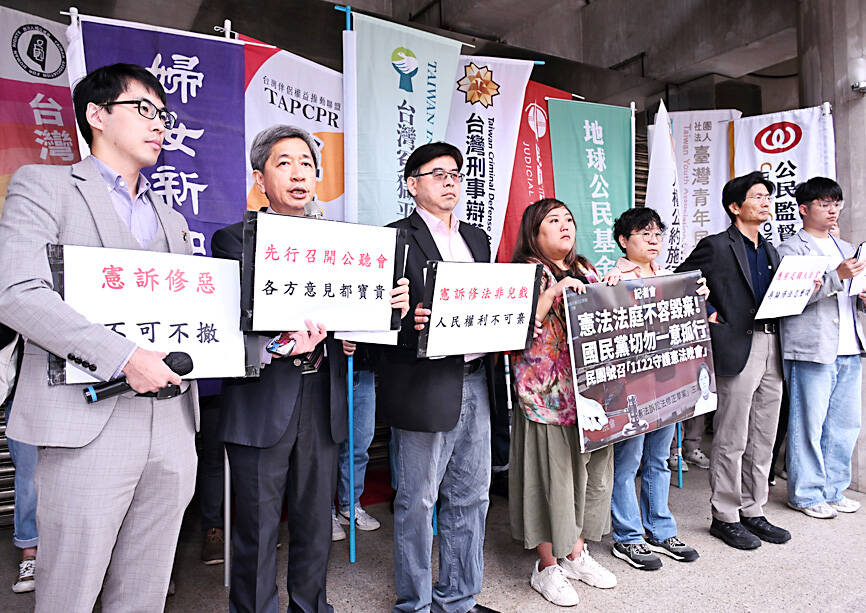Judicial Reform Foundation members and a group of civic organizations yesterday announced they would hold a rally on Friday demanding that the Chinese Nationalist Party (KMT) withdraw proposals to amend the Constitutional Court Procedure Act (憲法訴訟法).
KMT Legislator Weng Hsiao-ling (翁曉玲) has proposed specifying that the Constitutional Court must consist of 15 justices and that a two-thirds majority would be needed to issue a ruling.
The groups accused Weng and the KMT of using political ploys to destroy Taiwan’s constitutional democracy, abusing legislative authority to undermine the proper functioning of the judiciary and denying citizens their right to request a constitutional interpretation.

Photo: Fang Pin-chao, Taipei Times
They also said the proposal to raise the threshold was a major retrogression for the judicial reform movement and that paralyzing the Constitutional Court would create a constitutional crisis and lead to the dismantling of Taiwan’s democratic framework.
In a joint statement, the groups voiced five demands:
First, that Weng withdraw the bills immediately and apologize to the public.
Second, that TPP legislators oppose the amendments.
Third, legislators must not proceed with the amendment before ratifying the new nominees for Constitutional Court justices, as that would paralyze the Constitutional Court.
Fourth, the Legislative Yuan should listen to the opinions and suggestions of legal experts, civic society groups and all sectors of society regarding the amendments and the impact of such changes.
Lastly, legislators should take into account gender equality and the rights of workers, marginalized groups, indigenous peoples and the underprivileged.
Legislators, regardless of their political affiliations, must protect and maintain the functionality of the Constitutional Court, the groups said in the statement.
The event, titled “Defend the Constitution,” is to start on Friday evening outside the Legislative Yuan.

A strong continental cold air mass is to bring pollutants to Taiwan from tomorrow, the Ministry of Environment said today, as it issued an “orange” air quality alert for most of the country. All of Taiwan except for Hualien and Taitung counties is to be under an “orange” air quality alert tomorrow, indicating air quality that is unhealthy for sensitive groups. In China, areas from Shandong to Shanghai have been enveloped in haze since Saturday, the ministry said in a news release. Yesterday, hourly concentrations of PM2.5 in these areas ranged from 65 to 160 micrograms per cubic meter (mg/m³), and pollutants were

Taiwan’s armed forces have established response protocols for a wide range of sudden contingencies, including the “Wan Chun Plan” to protect the head of state, the Ministry of Defense (MND) said today. After US President Donald Trump on Saturday launched a series of airstrikes in Venezuela and kidnapped Venezuelan President Nicolas Maduro, concerns have been raised as to whether China would launch a similar “decapitation strike” on Taiwan. The armed forces regularly coordinate with relevant agencies and practice drills to ensure preparedness for a wide range of scenarios, Vice Minister of National Defense Hsu Szu-chien (徐斯儉) told reporters before a

EVA Airways on Saturday said that it had suspended a pilot and opened an investigation after he allegedly lost his temper and punched the first officer several times as their plane was taxiing before takeoff at Los Angeles International Airport. According to a report published on Thursday by The Reporter, the incident occurred after the flight’s Malaysian first officer tried to warn the Taiwanese pilot, surnamed Wen (文), that he was taxiing faster than the speed limit of 30 knots (55.6kph). After alerting the pilot several times without response, the first officer manually applied the brakes in accordance with standard operating

The New Taipei City Social Welfare Department on Thursday celebrated Paralympic competitor Chen Tzu-wei (張孜維), who received last year’s national Golden Eagle award for exemplary achievement by Taiwanese with disabilities. Chen, who suffers from childhood-onset muscular dystrophy, did not attend the first award ceremony held by the Ministry of Health and Welfare in November due to illness. Chen was formally presented with the award at the department, where he gave thanks to government workers for supporting his education and livelihood, the department said in a statement. Chen was raised by the Ai-hsin Home for Persons with Disabilities in the city’s Bali District (八里)